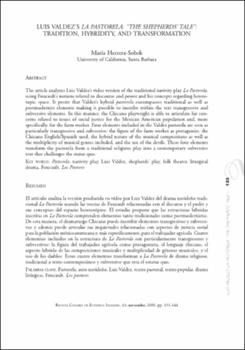Luis Valdez's La Pastorela: "The Shepherd's Tale". Tradition, Hybridity, and Transformation
Autor
Herrera-Sohek, MariaFecha
2001Resumen
El artículo analiza la versión producida en vídeo por Luis Valdez del drama navideño tradicional
La Pastorela usando las teorías de Foucault relacionadas con el discurso y el poder y
sus conceptos del espacio heterotópico. El estudio propone que las estructuras híbridas
inscritas en La Pastorela comprenden elementos tanto tradicionales como postmodernistas.
De esta manera, el dramaturgo Chicano puede inscribir elementos transgresivos y subversivos
y además puede articular sus inquietudes relacionadas con aspectos de justicia social
para la población méxicoamericana y, más específicamente, para el trabajador agrícola. Cuatro
elementos incluidos en la estructura de La Pastorela son particularmente transgresores y
subversivos: la figura del trabajador agrícola como protagonista, el lenguaje chicano, el
aspecto híbrido de las composiciones musicales y multiplicidad de géneros musicales, y el
uso de los diablos. Estos cuatro elementos transforman a La Pastorela de drama religioso,
tradicional a texto contemporáneo y subversivo que reta el estatus quo. The article analyzes Luis Valdez’s video version of the traditional nativity play La Pastorela,
using Foucault’s notions related to discourse and power and his concepts regarding heterotopic
space. It posits that Valdez’s hybrid pastorela encompasses traditional as well as
postmodernist elements making it possible to inscribe within the text transgressive and
subversive elements. In this manner, the Chicano playwright is able to articulate his concerns
related to issues of social justice for the Mexican American population and, more
specifically, for the farm worker. Four elements included in the Valdez pastorela are seen as
particularly transgressive and subversive: the figure of the farm worker as protagonist, the
Chicano English/Spanish used, the hybrid nature of the musical compositions as well as
the multiplicity of musical genres included, and the use of the devils. These four elements
transform the pastorela from a traditional religious play into a contemporary subversive
text that challenges the status quo.





